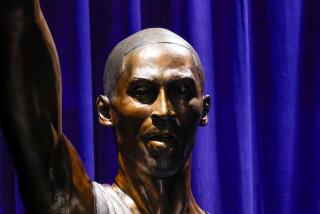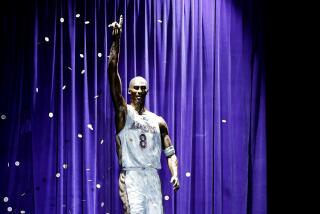L.A. mourns Kobe Bryant, an athlete who ‘transcends race and nationality’

L.A. mourns the death of Lakers legend Kobe Bryant.
They came to mourn, to remember and to seek solace — outside Staples Center in downtown Los Angeles, in Thousand Oaks, Redondo Beach and scores of places in between.
Across the metropolitan region, thousands of people grieved and reflected — some in solitude, some clustered in groups large and small, speaking in English, Spanish, Korean and countless other languages — over the death of Kobe Bryant, his daughter Gianna and seven others in a Sunday morning helicopter crash.
On the side of the Shoe Palace along Melrose, dozens stopped to stare up at a mural of Bryant, and the words, “on 4.13 Kobe played his final game ... this tribute has 413 triangles,” a reference to Bryant’s last NBA game, played April 13, 2016, at Staples Center. He scored 60 points in that farewell game.
When the news of his death broke earlier in the day, visitors began to paper the purple wall with yellow Post-it notes that read, “Kobe you were king of LA and legend of basketball R.I.P. bro,” “thx Kobe for everything you are LA,” and “thank you mamba for showing us what it means to be a champion.”
Daryl Vaskerville added a single red rose and three candles to the memorial. There was a bouquet of flowers, black and gold Nike shoes and people growing emotional in Bryant jerseys.
“He described in depth what it meant to be a champion,” Vaskerville said.
At El Camino Real in Fullerton, the staff was “really sad,” said manager Rodolfo Garcia. Bryant patronized the Mexican restaurant for 20 years, a favorite of his and his wife, a Fullerton native.
If he couldn’t come in person, Bryant would have friends get big orders to take back to his Newport Coast mansion.
“He liked the carnitas and flan,” Garcia said over the thud of a butcher breaking down carne asada for tacos. “Kobe would just stand in line, like anyone else. He’d tell us, ‘Don’t treat me like a star; I’m just a customer here.”
Restaurant customers scrolled through their smartphones between sips of menudo, shaking their heads in disbelief. Joel Viramontes of La Habra, who was wearing a Nike SpongeBob SquarePants sweatshirt that featured the cartoon icon dunking a basketball, took a call.
His face was a mask of pain. “Sí, ‘ama, ya se que se murio Kobe,” he said. Yes, Mom, I know that Kobe died.
The Lakers have cultivated a huge base of Korean American fans, a following that was amplified when the team became the NBA’s first to broadcast in Korean in 2013.
That was the year when Time Warner Cable, which invested nearly $3 billion for regional TV rights to Lakers games for the next two decades, hired five Korean Americans to serve as play-by-play announcers and color commentators, prompting crowds to swarm karaoke bars and restaurants to catch Bryant in action and to learn more about the sport through the intimacy of their native language.
“He’s one of these athletes that transcend race and nationality — I’ve been following him since he graduated from high school and went straight to the NBA,” recalled Alex Kim, 47, a public relations executive. “The fact that the team participated in outreach to our community only made them more popular. It showed that they and the business decision makers really support fans from all cultures.”
Like many famous athletes, Kobe is known just by one name all over Asia. Kim said that even his mother, who’s not devoted to sports, as well as scores of his fellow immigrants who do not monitor the on-court action, know the legend.
“We mourn through technology,” he added. “This way, we share our grief, locally and globally.”
Leslie Agan, 38, still keeps in her safe a carry-out tray signed “Kobe 8” that he autographed for her in 2000 when she was a cashier at the AMC 30 movie theater in Orange.
“I saw him just about every weekend at my first job, and he was always extremely kind and considerate,” said the Menlo Park resident. “The death of Kobe Bryant feels exactly like losing a childhood friend.”
In the city of Orange, as news spread of Bryant’s death, a Barnes & Noble quickly sold out of all photo books featuring the star.
“It’s kind of morose but people just came in 10 or 15 minutes after we found out about it,” said Armando Romero, a bookseller at the cash register.
Smartphone alerts accelerated the spread of news about the helicopter crash. In Marina del Rey, two women walking on a path Sunday afternoon suddenly stopped on the trail.
“Oh no,” one woman said, staring at her phone. “His teenage daughter was with him. It just came up.”
Along Washington Boulevard in Venice, mourners in purple and yellow Lakers T-shirts smoked outside bars and consoled one another.
“It just broke us,” said Frank Artechi, 30, who was at a bar with a buddy.
In the middle of the courtyard of L.A. Live, across the street from Staples Center, where Bryant’s electrifying performances helped propel the Lakers to five NBA championships, Monty Brianton, 54, wiped tears from his face with his right hand, glancing down at an impromptu memorial.
Nearby, Joe Rivas, 28 of Norwalk, stared at TV screens at the Yard House sports bar, watching Kobe highlights. Rivas was at the gym when he found out about Bryant’s death.
“Everyone stopped what they were doing, even the basketball games,” he said. “It’s as if the air left the building.”
At the busy intersection of Grant Avenue and Aviation Boulevard in Redondo Beach the cars kept streaming by Al Beck, 75, a retired FedEx worker, who was holding a neon-orange sign with one word he had written in black marker: KOBE.
Beck stands on the corner often, holding political signs, such as the misspelled word “Impechment???” People often swear at him. Sometimes they flip him off.
On Sunday, he said, pausing for several seconds to choke back tears, ”It’s been nothing but good vibes.”
Brittny Mejia, Anh Do, Hailey Branson-Potts, Ruben Vives, Cindy Carcamo, Gustavo Arellano and Dakota Smith contributed to this story.










